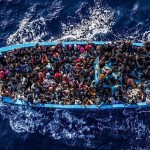International Research Academy on the History of Global Humanitarianism Academy Leaders: Fabian Klose (Leibniz Institute of European History Mainz) Johannes Paulmann (Leibniz Institute of European History Mainz) Andrew Thompson (University of Exeter) in co-operation with the International Committee of the Red Cross (Geneva) and with support by the German Historical Institute London Venues: University of Exeter, UK & Archives of the International Committee of the Red Cross, Geneva Dates: July 10-22, 2016 Deadline: December 31, 2015 Information at: http://hhr.hypotheses.org/ and http://imperialglobalexeter.com/ The international GLOBAL HUMANITARIANISM | RESEARCH Continue reading →
The European Agenda on Migration, published May 13 and implemented throughout the past summer, is a fascinating initiative. The policy has four stated “pillars”: (1) reducing incentives for unauthorized or “irregular” migration; (2) border management — which is understood as both border enforcement and saving the lives of migrants at risk; (3) a “strong common asylum policy” and (4) providing new avenues for legal migration. This agenda presents the EU’s most comprehensive attempt to address a surging number of asylum seekers and migrants now Continue reading →
Rescues at sea are dangerous and come with great possible cost to those involved. In this brief essay, I consider why, beyond a simple explanation of the imperative to protect life, civilian sailors rescue refugees at sea, and explore how specific extreme environments and professional identities may interface at the boundaries of humanitarian imagination, thought and action Before MSF and the navies of EU states became more involved in intercepting boatloads of refugees sinking into the Mediterranean, the job of pulling them out of the Continue reading →
There is this great anecdote that Gershom Scholem tells at the end of his monumental Major Trends in Jewish Mysticism. It speaks of the Baal Shem Tov, the eighteenth-century founder of Hasidism, who, when he had “a difficult task before him . . ., would go to a certain place in the woods, light a fire and meditate in prayer — and what he had set out to perform was done.” The tale follows the slow, generational loss of the elements that ensure successful results Continue reading →
At the heart of his provocative essay, Samuel Moyn highlights the shortcomings of the human rights framework to confront socioeconomic inequality. His central argument asserts that human rights norms articulate the minimal obligations of states to protect the poor but say nothing about the excesses of wealth, therefore accommodating a neoliberal ideology that fundamentally threatens human dignity. In my view, Moyn produces a brief but inadequate description of human rights provisions for social welfare (floors), overlooks some recent attempts at placing limits on accumulation (ceilings), Continue reading →
Some new research I am doing considers what — if anything — the explosion of human rights politics in our time has to do with our recently confirmed explosion of inequality across the same time period. An initial progress report appears in this weeks’s review section of the “Chronicle of Higher Education.” What do you think?
Scholars, pundits, opinion-makers, and the general public too often agree that the primary concern to address today in the contemporary Middle East is religious diversity and the need to protect religious minorities. As a result, the so-called religious minorities have gradually come to constitute a fundamental feature of state politics. They are usually depicted and discussed as unchangeable entities presenting coherent political assets in international affairs, as well as analytical categories through which a more immediate understanding of the Middle Eastern scenario is finally possible. This Continue reading →
This is one entry in a roundtable on the NIEO, featuring short articles by scholars who contributed to Humanity’s recent special issue on the topic. Be sure to read other posts by Johanna Bockman and Patrick Sharma. A conference centre in the small town of Haslemere, 43 miles south-west of central London, is an unlikely place to start a revolution. But it was there, in January 1968, that a group of twenty-five “young and disillusioned” members of Britain’s NGO sector (acting in an individual capacity, but happy to be recognised as Continue reading →
…the Vichy constitution of 1944. Its first article read: “The liberty and dignity of the human person are supreme values and intangible goods.” I have recently been looking into this, on a tip from James Chappel, with help from my research assistant Rachel Craft, and advice from my honored former colleague Bob Paxton. In case it is of general interest, or anyone out there knows more, I am reporting my findings here, which I am incorporating in the final version of my historical Continue reading →
The Graduate Institute of International and Development Studies, International Law Department, is holding a conference entitled “International Law and Time” in Geneva, Switzerland, from 12-13 June 2015. Registration for the conference is now open. The programme features the following panels: Attributing Meaning to Time: Visions of History and Future Role of Time in the Creation of Norms Time and the Operation of International Law Norms International Law between Change and Stability Continuity, Discontinuity, Recurrence Dealing with the Past: Legacy, Retroactivity and Beyond The conveners can Continue reading →

